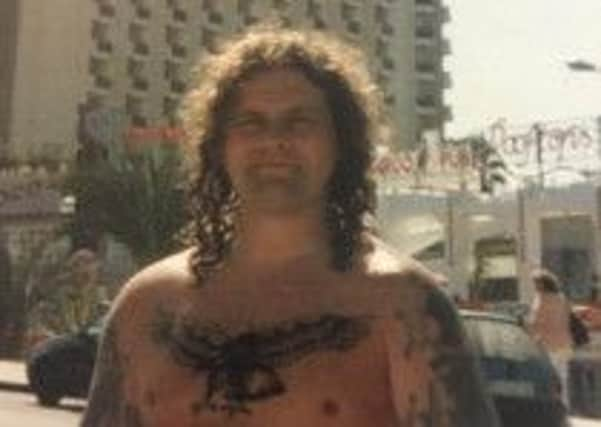Notorious Kirkby drug dealer failed by prison healthcare


Speaking after an inquest into the death of her son Paul Hardy at Nottingham Coroner’s Court yesterday June Hardy said Paul had been ‘badly treated’ and ‘neglected’ while in prison.
Convicted drug dealer Mr Hardy (51), had been serving 12 years at HMP Lowdham Grange after being jailed in September 2008 for his part in a conspiracy to supply heroin, amphetamines and cannabis.
Advertisement
Hide AdAdvertisement
Hide AdPaul, then of Willow Avenue, Kirkby, was part of a notorious Ashfield and Mansfield organised crime gang headed up by his brother, Gary, then of The Copse, Mansfield.
But while serving his sentence in February 2011 he started to complain of bladder pain and blood in his urine.
His symptoms worsened over the next four months until he was no longer able to sleep through the night without waking up in agonising pain, but he was not taken to hospital and diagnosed with prostate cancer until 6th June 2011 – sixteen weeks after he started displaying symptoms of the disease.
Paul died in January 2012 at the Queen’s Medical Centre.
His mother June said she believed the delay in diagnosis put Paul through needless pain.
Advertisement
Hide AdAdvertisement
Hide AdShe said: “My heart is broken due to the way Paul was treated by Lowdham Grange medical staff.
“When he saw blood in his urine and started to feel pain more often and for prolonged periods of time, all my alarm bells went off. I rang the prison every day and told them ‘my son is dying’ but all I seemed to hear in return was ‘Paul is OK.’
“Big mistakes were made by the medical staff at the prison – and if they had diagnosed Paul within a couple of weeks of the onset of his symptoms then I believe he would not have suffered as he did.”
Stephanie Haskey, HM Assistant Coroner for Nottinghamshire, made findings of fact that there was no joined up thinking or process to prevent errors of administration and there were no proper systems in place for tracking requests for samples and for following up the results. She also stated that all four GPs who gave evidence painted a picture of gaps in competence.
Advertisement
Hide AdAdvertisement
Hide AdMiss Haskey added that she would be making a report to ensure changes are put in place following the failings identified in Paul’s care, as there was concern that future deaths would occur unless action was taken.
Baishali Clayton, a clinical negligence solicitor at Nelsons Solicitors, said: “We will be initiating a civil claim against the prison healthcare staff in due course following what we believe is an unacceptable delay in diagnosing and treating prostate cancer.
“By the time Paul was diagnosed, his cancer had spread extensively, including into his bones, which resulted in him requiring surgery to stabilise a suspected fracture to his leg. It must have been incredibly painful for him.
“Paul displayed symptoms which should raise a red flag for any GP. He was in his 50s and had no history of blood in his urine – and these two facts combined should have prompted medical staff to refer him to hospital for an assessment for suspected cancer straight away. But that did not happen.
Advertisement
Hide AdAdvertisement
Hide Ad“All the GPs involved in Paul’s care who gave evidence at the inquest said that, in hindsight, they would have referred him sooner. But hindsight offers no consolation or relief to Paul’s mother June, who feels her son suffered unnecessarily during his last few months.”
During the inquest, the court also heard how bosses at Lowdham Grange should have instigated a ‘significant event analysis’ following the events during February to June 2011.
This investigation would have identified what went wrong in Paul’s care, why, and how to prevent it happening again, but there is no evidence that this was carried out.
Mrs Clayton, of Nelsons Solicitors, added: “We consider that Paul’s care while in prison was sub-optimal and we believe that if he had not been in prison at the time, he would have received better and timely medical care.
Advertisement
Hide AdAdvertisement
Hide Ad“Healthcare in prison is supposed to be equal to that in the community, but Paul was not in a position to take himself off to hospital for a second opinion when medical staff failed to take his concerns or symptoms seriously.
“What is also alarming is the lack of evidence of a significant event analysis taking place following the events of early to mid-2011.
“We hope that the prison takes on-board all recommendations made by the coroner today so that no other prisoner presenting as Paul did will suffer in the same way.”
Mrs Hardy added that her son was sorely missed by those who knew him.
Advertisement
Hide AdAdvertisement
Hide AdShe said: “Paul was very dear to me. He was extremely popular and had a lovely personality. He was a big man with a big heart and I am devastated that he did not receive the right care while he was in prison.”